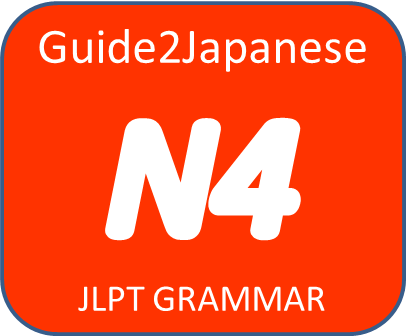JLPT N4 GRAMMAR: けんじょうご(kenjougo)
謙譲語 are the 敬語(polite expressions) in which the speaker humbles himself / herself and lowers his / her own acts to show respect to the listener or the person being referred to.
Pattern: お/ご~します
お is used before the verbs of Group I & II. However it is not used before the verbs which have one mora like みます or います. While ご is used before the verbs of Group III. This pattern involves another person beside the agent of the act, Therefore they are not applicable in the act that does not involve another person.
Example sentences:
- 重そうですね、お持ちしましょうか。
- Omo-sōdesu ne, o-mochi shimashou ka.
- It looks so heavy, shall I carry it for you?
- भारी लगता है, क्या मै इसे ऊठाऊ?
- 私が 社長に スケジュール を お知らせします。
- Watashi ga shachō ni sukejūru o oshirase shimasu.
- I will tell the schedule to president.
- मैं अध्यक्ष को शेड्यूल सूचित करूंगा।
- 兄が車でお送りします。
- Ani ga kuruma de ookuri shimasu.
- My elder brother will take you in his car.
- मेरा भाई आपको छोडेगा।
- 江戸東京博物館へご案内します.
- Edotōkyōhakubutsukan e go an’nai shimasu.
- I will take you to the Edo – Tokyo Museum.
- मै आपको ईदो टोक्यो संग्रहालय के लिए मार्ग दिखाऊंगा।
- 今日の 予定 を ご説明します。
- Kyō no yotei o go setsumei shimasu.
- I will explain today’s schedule.
- आज का शेड्यूल मै समझाऊंगा।
Special Humble verbs which contains humble meaning.
| 丁寧語動詞 Polite Verb | 謙譲語動詞 Humble verb |
| いきます きます | まいります |
| います | おります |
| たべます のみます もらいます | いただきます |
| みます | はいけんします |
| いいます | もうします |
| します | いたします |
| ききます (うちへ)いきます | うかがいます |
| しって います しりません | ぞんじております ぞんじません |
| あいます | おめにかかります |
When the speaker’s act involves the listener or the person to whom respect is directed.
- 社長の 奥様に お目に かかりました。
- Shachō no okusama ni o-me ni kakarimashita.
- I met the president’s wife.
- मैं राष्ट्रपति के पत्नी से मिला।
- 「明日は誰か手伝いに来てくれますか。」「私が 伺います」
- `Ashita wa dare ka tetsudai ni kite kuremasu ka.’`Watashi ga ukagaimasu’
- ”Who will come over to help me tomorrow?” ”I will.”
- “कल कोई मदद करने आऐगा?” “मैं आऊंगा।”
When the speaker act doesnot involve the listener or the person to whom the respect is directed.
- ミラーと申します。
- Mirā tomōshimasu.
- My name is miller.
- मेरा नाम मिलर है।
- アメリカから参りました。
- Amerika kara mairimashita.
- I came from United States.
- में अमेरिका से हूँ /आया हु।
丁寧語(Polite expressions) used to show the speaker’s respect to the listener.
~ございます is the polite equivalent of あります.
- 電話が階段の横にございます。
- Denwa ga kaidan no yoko ni gozaimasu.
- The pay phone is besides the stairs.
- सीढ़ियों के बगल में एक टेलीफोन है।
~でございます is the polite equivalent ofです.
- 「はい、IMCでございます。」「パワー電気のシュミットですが、ミラーさん、お願いします。」
- `Hai, aiemushīdegozaimasu.’`Pawā den ki no Shumittodesuga, mirā-san onegaishimasu.’
- “Hello this is IMC” “This is Schmitto of power electric, May I speak to Mr. Miller.”
- “हैलो, यह आईएमसी है।” “मै पावर इलेक्ट्रीक से श्मिट हु, श्री मिलर से बात करनी है।”
よろしいでしょうか is a polite equivalent of いいですか.
- 「お飲み物は何がよろしいでしょうか。」「コーヒーをお願いします。」
- `O nomimono wa nani ga yoroshīdeshou ka.’`Kōhī o onegaishimasu.’
- “What would you like to drink?” “Coffee Please.”
- “आप पेय में क्या लेना पसंद करेंगे?” “कॉफी पसंद करुंगा।”
- このパンフレットをいただいてもよろしいでしょうか。
- Kono panfuretto o itadaite mo yoroshīdeshou ka.
- May I have one of these pamplet?
- क्या मुझे यह ब्रोशर मिलेगा?



